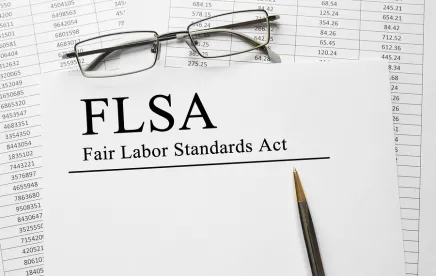While the COVID-19 pandemic remains a challenge to employers nationwide, the U.S. Department of Labor’s Wage and Hour Division (“WHD”) continues to field non-COVID-related wage and hour questions. On June 25, 2020, the WHD issued five new opinion letters addressing the outside sales, administrative, and retail or service establishment exemptions under the Fair Labor Standards Act (“FLSA”), as well as the relationship between third-party payments to workers and the FLSA’s minimum wage requirement. Employers should take note of these useful explanations of key FLSA concepts.
FLSA2020-6
In FLSA2020-6, the WHD analyzed the applicability of the FLSA’s outside sales exemption to salespeople paid a base salary and commission to travel to different locations to sell products using their employer’s mobile assets. As transport, the salespeople use stylized trucks stocked with merchandise, marketing displays, and demonstration units. The salespeople use electronic tablets to make their presentations. They spend 80% of their time on sales deployments and 20% of their time handling sales-related duties such as event planning and inventory management. They manage their “event calendar” and how to stock the truck for each deployment. They receive sales training from the employer.
To meet the outside sales exemption, an employee’s primary duty must be “making sales” to or “obtaining orders or contracts for services” from customers (with “sale” including sales work and work performed incidental to and in conjunction with sales/solicitations), and the employee must be “customarily and regularly engaged” in performing that duty “away from the employer’s place or places of business.” 29 CFR §§ 541.500(a), -.501, -.502; see also 29 U.S.C. § 203(k).
The WHD found these criteria satisfied here. First, that the employees’ primary duty is to make sales and to obtain orders for services is clear from the fact that they (1) travel to consumer locations to sell tangible products and to obtain signatures for service contracts; (2) earn a commission on their own sales; and (3) receive sales training. Employees who spend more than half their time performing exempt work generally satisfy the primary duty requirement (29 C.F.R. § 541.700(b)), and even the 20% of their working time spent on sales-related activities furthers their own out-of-office sales efforts, thereby constituting exempt sales activities under the FLSA.
Second, the employees are customarily and regularly away from the employer’s place of business because they spend 80% of their working time deployed away from the employer’s place of business, which exceeds the “greater than occasional but … less than constant” standard (29 C.F.R. § 541.701). Here the WHD noted that the trucks themselves are not “places of businesses”—i.e., a “fixed site…used by a salesperson as a headquarters.” Not only do these trucks move to and from a different sales site every day, but once at the site, the employees go out into the crowds to mingle with consumers, which is analogous to a salesperson who drives to a neighborhood and then solicits sales door to door— an example falling squarely within the outside sales exemption.
FLSA2020-7
As background, the FLSA requires employers to pay their covered, nonexempt employees a minimum hourly wage for all hours worked. 29 U.S.C. § 206(a). Wages under the FLSA may include third-party payments. A payment from a third party is a wage when the employer and employee have an agreement, express or implied, to treat it as such. 29 C.F.R. § 778.108. In the Third Circuit’s view, other facts that may be probative in determining whether a third-party payment is part of an implied employment agreement include (1) whether the specific requirements for receiving the payment are known by the employees in advance of their performing the relevant work; (2) whether the payment is for a reasonably specific amount; and (3) whether the employer’s facilitation of the payment is more than serving as a pass-through vehicle, as with, e.g., processing tips. U.S. Dep’t of Labor v. Bristol Excavating, Inc., 935 F.3d 122, 137 (3d Cir. 2019).
In FLSA2020-7, the WHD analyzed whether payments to automobile sales consultants from manufacturers pursuant to an incentive program are wages for purposes of the employing dealership’s FLSA’s minimum wage requirements. Concluding that these payments are wages, the WHD emphasized that the dealerships embrace these third-party incentive payments as wages, the employees know of the specific program incentive terms in advance of their performing sales work, and the dealership facilitates these payments by communicating these terms to their employees and working with incentive program sponsors to determine when payments should occur.
FLSA2020-8
In FLSA 2020-8, the WHD analyzed whether the FLSA’s outside sales exemption applies to salespeople who travel to various retail operations—home and garden shows, trade shows, state and county fairs, and big-box stores—for sales demonstrations/pitches lasting, on average, 10 days, with no one retail location used for more than 30 total days per year. The salespeople receive sales training, earn commissions, and are eligible for bonuses based on purchases customers make during their assigned shows. At retail operations shows, customers pay the retailer, and a portion of those sales passes through to the employer. At all other shows, the salespeople process the payment directly and no third-party retailer is involved.
The WHD advised that the salespeople at locations other than big-box stores qualify for the outside sales exemption, whereas the salespeople at big box stores qualify for the exemption only if their primary duty is performing sales work directed toward the consummation of their own sales. In drawing this distinction, the WHD explained that salespeople at shows and fairs sell products directly to consumers and that the employer hires them for their sales experience. They earn commissions and bonuses based on purchases at these shows (i.e., their own sales) and receive sales training. In contrast, employees at big-box stores purchase the products through the third-party retailer, not from the employee directly, and thus the employees’ primary duty may not be “making sales.” To make sales within the meaning of the exemption, the employee must obtain a commitment to buy from the customer and receive credit for the sale. Without information about whether and how an employee obtains a commitment from a customer to buy the employer’s products, the WHD could not say whether the facts satisfy this standard. Nevertheless, the employees may still be eligible for the outside sales exemption if they spend the majority of their time in non-big box location sales pitches—i.e., if their primary duty is performing exempt work. 29 C.F.R. § 541.700(a). As a reminder, spending the majority of one’s time on exempt activity is not a necessary element in establishing the primary duty, but time is a relevant part of the primary duty inquiry.
The WHD also concluded that the employees at all locations are customarily and regularly away from the employer’s place of business because the sales locations are not fixed, and the employees used none of these locations for more than a limited duration. 29 C.F.R. § 541.502. Furthermore, the WHD has long held that the outside sales exemption encompasses sales somewhere besides a customer’s home or office.
FLSA2020-9
FLSA 2020-9 analyzes whether emergency-management coordinators employed by a county government qualify for the learned professional or administrative exemptions to the FLSA. The coordinators must have a bachelor’s degree in public administration, political science, emergency management, or a related field; certification in specific courses offered through FEMA Emergency Management Institute; and soon, a state certification in emergency management. The coordinators’ duties include, inter alia, assisting schools, organizations, and industries with emergency operation plans; coordinating community resources; reporting activities and conditions accordingly; requesting assistance as needed; organizing disaster drills and exercises for all phases of emergency management; reviewing results; and making improvements.
To qualify for either the professional or administrative exemption, generally an employee must receive compensation on a salary or fee basis at not less than the standard level and must have a qualifying primary duty. 29 C.F.R. §§ 541.200(a)(1), -.300(a)(1). The primary duty of an exempt learned professional must be performing work that requires advanced knowledge (i.e., work that is predominantly intellectual in character rand requires the consistent exercise of discretion and judgment) in a field of science or learning customarily acquired through a prolonged course of specialized intellectual instruction. 29 C.F.R. § 541.301(a). The primary duty of an exempt administrative employee must be performing office or non-manual work with discretion and independent judgment with respect of matters of significance and must relate directly to management or general business operations of the employer/employer’s customers. 29 C.F.R. § 541.200(a)(2)-(3).
Recognizing the difficulty in determining whether the job duties of government positions are exempt under the administrative position, the WHD looked to whether the duties involve the day-to-day carrying out of the government’s functions or, on the other hand, running the government itself. Under this framework, the WHD concluded that certain of the coordinators’ duties are exempt and others will depend on the circumstances of how and when those duties are exercised and precisely what they entail. At a high level, the WHD characterized the coordinators’ planning and business management duties as largely exempt because they directly relate to the management or general business operations of the employer or the employer’s customers. Likewise exempt are the coordinators’ duties of handling the county’s relationships with other federal, state, and local and government entities; preparing news releases, acting as a press officer, and furnishing information to the media; recruiting, supervising, and scheduling volunteers; and writing and reviewing grant proposals.
Lacking the requisite information, the WHD did not attempt to identify the coordinators’ primary duty. Similarly, the WHD did not analyze the discretion and independent judgment element because the employer represented that this requirement was satisfied.
The WHD noted that it could not advise on whether the coordinator position qualifies for the learned professional doctrine.
FLSA2020-10
As background, the retail or service establishment commissioned sales exemption applies if (1) the employee is employed by a retail or service establishment; (2) the employee’s regular rate of pay exceeds one and one-half times the minimum hourly rate; and (3) more than half of the employee’s compensation for a representative period (not less than one month) consists of commissions on goods or services. 29 U.S.C. § 207(i); 29 C.F.R. § 779.412.
In FLSA2020-10, the WHD analyzed whether the retail or service establishment commissioned sales exemption is available where:
-
The client hires employees to work at a new store with unknown volume or new salespeople with no track record of making sales, who are guaranteed compensation at one and one-half times the applicable minimum wage for all hours worked during a representative period;
-
The commissions requirement is not met every week; and
-
The client cannot determine whether more than half of the compensation that the salesperson will receive by the end of the full representative period will consist of sales commissions at the end of the representative period.
The WHD reaffirmed that an employer can use the Section 7(i) exemption simultaneously with commencement of the representative period. Consistent with its earlier guidance, the WHD cautioned that if at the conclusion of the initial representative period, the employee’s commissions do not constitute more than half of his or her compensation, the employee must receive overtime premium compensation for any overtime hours worked during that period. The employer could again attempt to establish a representative period for the new employee and simultaneously claim the Section 7(i) exemption for that employee on a prospective basis.




 />i
/>i

